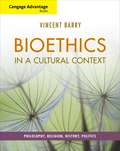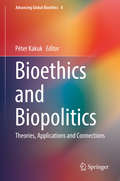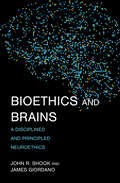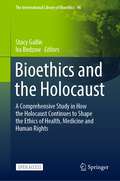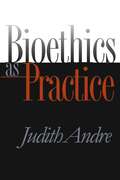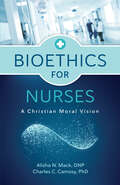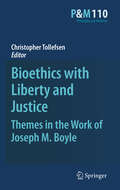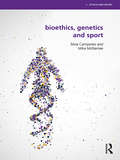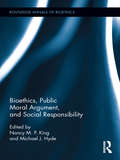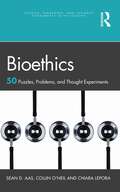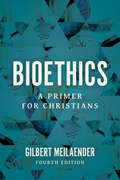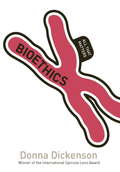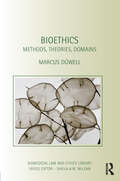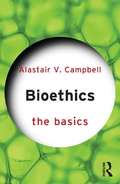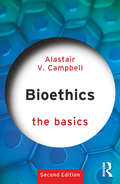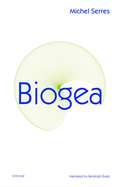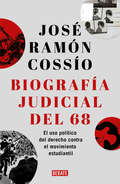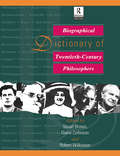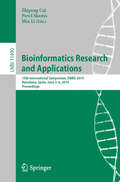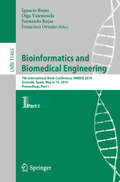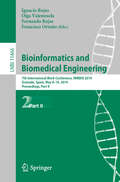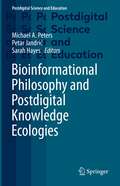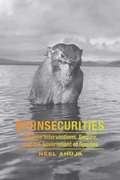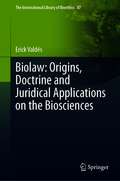- Table View
- List View
Bioethics In A Cultural Context: Philosophy, Religion, History, Politics
by Vincent BarryBIOETHICS IN A CULTURAL CONTEXT--PHILOSOPHY, RELIGION, HISTORY, POLITICS presents a unique, philosophical approach to modern bioethics. Rather than simply setting up debates about contemporary issues, this book helps students understand that many of today's bioethical controversies are tied to profound underlying questions fundamental as: When does life begin and end? What is a human being or person? What is life's purpose? What is the ideal society? The text is comprehensive and accessible, featuring a wide range of content that is crisply presented and clearly explained. A multitude of interesting examples and cases provides ample opportunity for discussion, debate, and research.
Bioethics and Biopolitics: Theories, Applications and Connections (Advancing Global Bioethics #8)
by Péter KakukThis volume links three different theoretical approaches that have a common focus on the relationship between biopolitics and bioethics. This collection of papers can be categorized into different domains that are representative of the contemporary usage of biopolitics as a concept. On the one hand, several chapters develop a clear and up-to-date understanding of the primary sources of the concept and related theories of Agamben, Negri or Foucault and approach the question of relevance within the field of bioethics. Another group of papers apply the philosophical concepts and theories of biopolitics (biopower, Homo Sacer, biocitizenship) on very specific currently debated bioethical issues. Some scholars rely on the more mundane understanding of (bio)politics and investigate how its relationship with bioethics could be philosophically conceptualized. Additionally, this work also contains papers that follow a more legally oriented analysis on the effects of contemporary biopolitics on human rights and European law. The authors are philosophers, legal scholars or bioethicists. The major strength of this volume is to provide the reader with major insights and orientation in these different contemporary usages of the concept and theories of biopolitics, within the context of its various ethically relevant applications.
Bioethics and Brains: A Disciplined and Principled Neuroethics (Basic Bioethics)
by John R. Shook James GiordanoHow neuroethics can be increasingly relevant and informative for inclusive social policy and political discourse about brain science and technologies.Neuroethics, a field just over two decades old, addresses both ethical issues generated in and by brain sciences and the neuroscientific studies of moral and ethical thought and action. These foci are reciprocally interactive and prompt questions of how science and ethics can and should harmonize. In Bioethics and Brains, John R. Shook and James Giordano ask: How can the brain sciences inform ethics? And how might ethics guide the brain sciences and their real-world applications?The authors&’ structure for a disciplined neuroethics reconciles science and ethics by requiring ethical principles consistent with moral neuroscience and moral psychology. Their cosmopolitan perspective looks beyond Western theories toward a new metaethics for neuroethics and illustrates its approach in chapters that address the issues and approaches to questions and problems generated by the proliferation of neurotechnology in global contexts. Shook and Giordano posit that neuroethics can merge science and ethics toward establishing global consensus on guiding brain research, neurotechnological innovation, and grounding neurorights.
Bioethics and the Holocaust: A Comprehensive Study in How the Holocaust Continues to Shape the Ethics of Health, Medicine and Human Rights (The International Library of Bioethics #96)
by Ira Bedzow Stacy GallinThis open access book offers a framework for understanding how the Holocaust has shaped and continues to shape medical ethics, health policy, and questions related to human rights around the world. The field of bioethics continues to face questions of social and medical controversy that have their roots in the lessons of the Holocaust, such as debates over beginning-of-life and medical genetics, end-of-life matters such as medical aid in dying, the development of ethical codes and regulations to guide human subject research, and human rights abuses in vulnerable populations. As the only example of medically sanctioned genocide in history, and one that used medicine and science to fundamentally undermine human dignity and the moral foundation of society, the Holocaust provides an invaluable framework for exploring current issues in bioethics and society today. This book, therefore, is of great value to all current and future ethicists, medical practitioners and policymakers – as well as laypeople.
Bioethics as Practice
by Judith Andre<P>Those who work in bioethics and the medical humanities come from many different backgrounds, such as health care, philosophy, law, the social sciences, and religious studies. The work they do also varies widely: consulting on ethical issues in patient care, working with legislatures, dealing with the media, teaching, speaking, writing and more. <P>Writing as a participant in this developing field, Judith Andre offers a model to unify its diversity. Using the term "bioethics" broadly, to include all the medical humanities, she articulates ideals for the field, identifies its temptations and moral pitfalls, and argues for the central importance of certain virtues. Perhaps the most original of these is the virtue of choosing projects well, which demands not only broadening the field's focus but also understanding the forces that have kept it too narrow. Andre offers an imaginative analysis of the special problems presented by interdisciplinary work and discusses the intellectual virtues necessary for its success. She calls attention to the kinds of professional communities that are necessary to support good work. <P>The book draws from interviews with many people in the field and from the findings of social scientists. It includes the author's personal reflections, several extended allegories, and philosophical analysis. <P>Those who work in bioethics and the medical humanities come from many different backgrounds: health care, philosophy, law, social sciences, religious studies, and more. The work they do also varies widely. Writing as a participant in this developing field, Judith Andre offers a model to unify its diversity. Using the term "bioethics" broadly, to include all the medical humanities, she articulates ideals for the field, identifies its temptations and moral pitfalls, and argues for the central importance of certain virtues.-->
Bioethics for Nurses: A Christian Moral Vision
by Charles C. Camosy Alisha N. MackRecovering the foundation of faith in a profession enduring the pressures of a rapidly changing health-care system.If you are one of the millions of Christian nurses or nursing students in the United States, you already know that there is no real way to separate your faith commitments from your professional vocation—nor would you want to. Especially amid the bedlam of the COVID-19 pandemic, faith has given countless nurses the strength to carry on and be there for their patients, one exhausting shift after another.Bioethics for Nurses, the first book of its kind, is for nurses and nurses in training who still believe in treating the whole person—not just their medical condition. It is for those committed to living out the love of Jesus Christ through the warm, relational care they provide for all hurting and vulnerable people—including those in underserved populations—each of whom has the dignity of a human being made in the image of God. It is also for those who rightly see themselves as crucial members of medical teams alongside doctors (and sometimes without doctors present at all), empowered to exercise professional judgment while protecting their consciences.With the combined wisdom of Alisha Mack, a professor of nursing with many years of clinical experience, and Charles Camosy, an award-winning bioethicist and theologian, Bioethics for Nurses advances a vision for a holistic Christian notion of health care with practical applications for everyday relevance on the job. Through a series of case studies in the second part of the book, Mack and Camosy explore the ethics of specific situations with far-reaching implications for nurses working in a range of fields. In the last part, the authors reflect on the future of nursing after COVID-19, making this an especially timely book for a pivotal moment in the history of the profession. Now, more than ever before, the wisdom of the ancient tradition of Christianity is needed to speak into the profound contemporary realities we are facing together as a culture.
Bioethics with Liberty and Justice: Themes in the Work of Joseph M. Boyle (Philosophy and Medicine #110)
by Christopher TollefsenJoseph M. Boyle Jr. has been a major contributor to the development of Catholic bioethics over the past thirty five years. Boyle's contribution has had an impact on philosophers, theologians, and medical practitioners, and his work has in many ways come to be synonymous with analytically rigorous philosophical bioethics done in the Catholic intellectual tradition. Four main themes stand out as central to Boyle's contribution: the sanctity of life and bioethics: Boyle has elaborated a view of the ethics of killing at odds with central tenets of the euthanasia mentality, double effect and bioethics: Boyle is among the pre-eminent defenders of a role for double effect in medical decision making and morality, the right to health care: Boyle has moved beyond the rhetoric of social justice to provide a natural law grounding for a political right to health care; and the role of natural law and the natural law tradition in bioethics: Boyle's arguments have been grounded in a particularly fruitful approach to natural law ethics, the so-called New Natural Law theory. The contributors to BIOETHICS WITH LIBERTY AND JUSTICE: THEMES IN THE WORK OF JOSEPH M. BOYLE discuss, criticize, and in many cases extend the Boyle's advances in these areas with rigor and sophistication. It will be of interest to Catholic and philosophical bioethicists alike.
Bioethics, Genetics and Sport (Ethics and Sport)
by Silvia Camporesi Mike McNameeAdvances in genetics and related biotechnologies are having a profound effect on sport, raising important ethical questions about the limits and possibilities of the human body. Drawing on real case studies and grounded in rigorous scientific evidence, this book offers an ethical critique of current practices and explores the intersection of genetics, ethics and sport. Written by two of the world's leading authorities on the ethics of biotechnology in sport, the book addresses the philosophical implications of the latest scientific developments and technological data. Distinguishing fact from popular myth and science fiction, it covers key topics such as the genetic basis of sport performance and the role of genetic testing in talent identification and development. Its ten chapters discuss current debates surrounding issues such as the shifting relationship between genetics, sports medicine and sports science, gene enhancement, gene transfer technology, doping and disability sport. The first book to be published on this important subject in more than a decade, this is fascinating reading for anyone with an interest in the ethics of sport, bioethics or sport performance.
Bioethics, Public Moral Argument, and Social Responsibility (Routledge Annals of Bioethics)
by Nancy M. P. King Michael J. HydeBioethics, Public Moral Argument, and Social Responsibility explores the role of democratically oriented argument in promoting public understanding and discussion of the benefits and burdens of biotechnological progress. The contributors examine moral and policy controversies surrounding biomedical technologies and their place in American society, beginning with an examination of discourse and moral authority in democracy, and addressing a set of issues that include: dignity in health care; the social responsibilities of scientists, journalists, and scholars; and the language of genetics and moral responsibility.
Bioethics: 50 Puzzles, Problems, and Thought Experiments (Puzzles, Paradoxes, and Thought Experiments in Philosophy)
by Collin O'Neil Chiara Lepora Sean D. AasBioethics: 50 Puzzles, Problems, and Thought Experiments collects 50 cases—both real and imaginary—that have been, or should be, of special interest and importance to philosophical bioethics. Cases are collected together under topical headings in a natural order for an introductory course in bioethics. Each case is described in a few pages, which includes bioethical context, a concise narrative of the case itself, and a discussion of its importance, both for broader philosophical issues and for practical problems in clinical ethics and health policy. Each entry also contains a brief, annotated, list of suggested readings. In addition to the classic cases in bioethics, the book contains discussion of cases that involve several emerging bioethical issues: especially, issues around disability, social justice, and the practice of medicine in a diverse and globalized world.Key Features: Gives readers all chapters presented in an identical format: The Case Responses Suggested Readings Includes reference to up-to-date literature in journals devoted both to more generalist ethics and to bioethics Offers short and self-contained chapters, allowing students to quickly understand an issue and giving instructors flexibility in assigning readings to match the themes of the course Features actual or lightly fictionalized cases in humanitarian aid, offering a type of case that is often underrepresented in bioethics books Authored by three scholars who are actively involved in the central research areas of bioethics
Bioethics: A Primer for Christians
by Gilbert MeilaenderAmid continuing advances in medical research and treatment, Gilbert Meilaender&’s Bioethics has long provided thoughtful guidance on many of society&’s most difficult moral problems—including abortion, assisted reproduction, genetic experimentation, euthanasia, and much more. In this fourth edition, Meilaender updates much of the data referenced in the book and responds directly to recent developments, such as the CRISPR/Cas9 method of gene editing. Christians seeking discernment in this new decade will appreciate Meilaender&’s circumspect writing and his ability to address the nuances of each issue while maintaining strong and clearly stated moral convictions.
Bioethics: All That Matters
by Donna DickensonIn this book:Donna Dickenson - Winner of the International Spinoza Lens AwardShould we do what ever science lets us do?Bioethics: All That Matters, new developments in biotechnology like genetics, stem cell research and artificial reproduction arouse both our greatest hopes and our greatest fears. Many people invest the new biotechnology with all the aspirations and faith once accorded to religious salvation. But does everyone benefit equally from scientific progress? Commercialised modern biomedicine runs the risk of exploiting vulnerable groups, from Indian 'surrogate' mothers to professional guinea pigs in drug research. Professor Dickenson argues that although we've entered new scientific territory, there's no need to jettison our existing moral sense. By discussing a range of real-life cases, she equips readers to make up their own minds on these important and controversial questions. Good science and good ethics needn't be contradictory.This accessible and concise book will appeal to both students and general readers, giving a fascinating introduction to a wide range of perspectives on Bioethics.All That Matters books:All books in the All That Matters series are written by world experts in their subject field. These experts work to distil a topic and get right to its heart, making the book accessible for both students and general readers. Each compelling book contains new and interesting perspectives and tells stories that matter.The Author:All That Matters - Interesting introductions to important issuesBooks on the following subjects are available from the All That Matters series: Muhammad, God, Water, Political Philosophy, Sustainability, Philosophy, Intelligence, Love, Russian Revolution, War, and Creativity.To find out more visit: www.allthatmattersbooks.com
Bioethics: Methods, Theories, Domains (Biomedical Law and Ethics Library)
by Marcus DüwellThis book is a philosophically-oriented introduction to bioethics. It offers the reader an overview of key debates in bioethics relevant to various areas including; organ retrieval, stem cell research, justice in healthcare and issues in environmental ethics, including issues surrounding food and agriculture. The book also seeks to go beyond simply describing the issues in order to provide the reader with the methodological and theoretical tools for a more comprehensive understanding of current bioethical debates. The aim of the book is to present bioethics as an interdisciplinary field, to explore its close relation to other disciplines (such as law, life sciences, theology and philosophy), and to discuss the conditions under which bioethics can serve as an academically legitimate discipline that is at the same time relevant to society. As a systematic and methodologically rigorous overview, Bioethics: Methods, Theories and Principles will be of particular interest to academics and students in the disciplines of Law, Medicine, Ethics and Philosophy. 'This is a book that embraces neither a single ethical theory nor a pragmatic melange of just-so-principles. It is a thoughtful and engaging analysis of diverse theoretical foundations in Bioethics. It is also an enormous step towards conceptual and philosophical clarity in this fascinating area.' - Professor Christian Illies, Chair for Practical Philosophy at the Otto-Friedrich University Bamberg, Germany
Bioethics: The Basics
by Alastair V. CampbellBioethics: The Basics is an introduction to the foundational principles, theories and issues in the study of medical and biological ethics. Readers are introduced to bioethics from the ground up before being invited to consider some of the most controversial but important questions facing us today. Topics addressed include: The range of moral theories underpinning bioethics Arguments for the rights and wrongs of abortion, euthanasia and animal research Healthcare ethics including the nature of the practitioner-patient relationship Public policy ethics and the implications of global and public health Concise, readable and authoritative, this is the ideal primer for anyone interested in the study of bioethics.
Bioethics: The Basics (The Basics)
by Alastair V. CampbellBioethics: The Basics is an introduction to the foundational principles, theories and issues in the study of medical and biological ethics. Readers are introduced to bioethics from the ground up before being invited to consider some of the most controversial but important questions facing us today. Topics addressed include: the range of moral theories underpinning bioethics arguments for the rights and wrongs of abortion, euthanasia and animal research health care ethics including the nature of the practitioner-patient relationship public policy ethics and the implications of global and public health ‘3 parents’, enhancement, incidental findings and nudge approaches in health care. This thoroughly revised second edition provides a concise, readable and authoritative introduction for anyone interested in the study of bioethics.
Biogea (Univocal)
by Michel SerresBiogea is a mixture of poetry, philosophy, science, and biography exemplary of the style that has made Michel Serres one of the most extraordinary thinkers of his age. His philosophical and poetic inquiry sings in praise of earth and life, what he names singularly as Biogea. In these times when species are disappearing, when catastrophic events such as earthquakes and tsunamis impale the earth, Serres wonders if anyone &“worries about the death pangs of the rivers.&” And for Serres, one can ask the same question of philosophy as the humanities increasingly find themselves in need of defenders. Today, all living organisms discover themselves part of this Biogea. &“Today we have other neighbors, constituents of the Biogea: the sea, my lover; our mother, the Earth, becomes our daughter; this beautiful breeze which inspires the spirit, a spiritual mistress; our light friends, the fresh and flowing waters.&”
Biografía judicial del 68: El uso político del derecho contra el movimiento estudiantil
by José Ramón Cossío DíazDetrás de los macanazos y las balas, hubo un sistema judicial que convalidó la represión y actuó convencido de su bondad. Nació el 26 de julio de 1968 y murió dos años después. Pero en su corta vida, multiplicó la iniquidad y la injusticia, provocó el encarcelamiento de decenas de jóvenes y evidenció la saña del Estado. Ésta es la historia -nunca antes contada- del proceso judicial contra los implicados en el 68 mexicano. Arranca con la apertura de una averiguación previa y expira cuando se dictan las sentencias condenatorias. En esta obra, que marca un parteaguas en los estudios sobre el movimiento estudiantil del 68, el exministro de la Suprema Corte José Ramón Cossío nos entrega una labor realizada por varias décadas: el análisis de los 60 tomos de aquel proceso, y presenta las evidencias que demuestran los vicios del juicio, las confesiones del ministerio público, las frases autoinculpatorias del juez y las defensas desesperadas de los estudiantes torturados que intentaban evitar Lecumberri.
Biographical Dictionary of Twentieth-Century Philosophers
by Diane Collinson Stuart BrownA hefty dictionary of over 1,000 entries featuring brief biographies of the lives and work of influential philosophers during the 20th century. The editors have also included thinkers who perhaps would not be strictly considered "philosopher," but have nonetheless made important intellectual contributions (Hannah Arendt, Noam Chomsky, Umberto Eco, C.G. Jung, Julia Kristeva, Max Weber). Besides the comprehensive and consistent scope of the dictionary, the volume also features a bibliography for each entry, a glossary containing short accounts of the origins, development and features of the major schools, movements and traditions in philosophy, and cross referenced indices. Annotation c. by Book News, Inc., Portland, Or.
Biographical Dictionary of Twentieth-Century Philosophers (Routledge World Reference Ser.)
by Stuart Brown Robert Wilkinson DianThis Biographical Dictionary provides detailed accounts of the lives, works, influence and reception of thinkers from all the major philosophical schools and traditions of the twentieth-century. This unique volume covers the lives and careers of thinkers from all areas of philosophy - from analytic philosophy to Zen and from formal logic to aesthetics. All the major figures of philosophy, such as Nietzsche, Wittgenstein and Russell are examined and analysed. The scope of the work is not merely restricted to the major figures in western philosophy but also covers in depth a significant number of thinkers from the near and far east and from the non-European Hispanic-language communities.The Biographical Dictionary also includes a number of general entries dealing with important schools of philosophy, such as the Vienna Circle, or currents of thought, such as vitalism. These allow the reader to set the individual biographies in the context of the philosophical history of the period. With entries written by over 100 leading philosophy scholars, the Biographical Dictionary is the most comprehensive survey of twentieth-century thinkers to date.StructureThe book is structured alphabetically by philosopher. Each entry is identically structured for ease of access and covers:* nationality* dates and places of birth and death* philosophical style or school* areas of interest* higher education* significant influences* main appointments* main publications* secondary literature* account of intellectual development and main ideas* critical reception and impactAt the end of the book a glossary gives accounts of the schools, movements and traditions to which these philosophers belonged, and thorough indexes enable the reader to access the information in several ways:* by nationality* by major areas of contribution to philosophy e.g. aesthetics* by major influences on the thinker concerned e.g. Plato, Kant, Wittgenstein
Bioinformatics Research and Applications: 15th International Symposium, ISBRA 2019, Barcelona, Spain, June 3–6, 2019, Proceedings (Lecture Notes in Computer Science #11490)
by Min Li Pavel Skums Zhipeng CaiThis book constitutes the proceedings of the 15th International Symposium on Bioinformatics Research and Applications, ISBRA 2019, held in Barcelona, Spain, in June 2019. The 22 full papers presented in this book were carefully reviewed and selected from 95 submissions. They were organized in topical sections named: genome analysis; systems biology; computational proteomics; machine and deep learning; and data analysis and methodology.
Bioinformatics and Biomedical Engineering: 7th International Work-Conference, IWBBIO 2019, Granada, Spain, May 8-10, 2019, Proceedings, Part I (Lecture Notes in Computer Science #11465)
by Ignacio Rojas Francisco Ortuño Olga Valenzuela Fernando RojasThe two-volume set LNBI 11465 and LNBI 11466 constitutes the proceedings of the 7th International Work-Conference on Bioinformatics and Biomedical Engineering, IWBBIO 2019, held in Granada, Spain, in May 2019. The total of 97 papers presented in the proceedings, was carefully reviewed and selected from 301 submissions. The papers are organized in topical sections as follows: Part I: High-throughput genomics: bioinformatics tools and medical applications; omics data acquisition, processing, and analysis; bioinformatics approaches for analyzing cancer sequencing data; next generation sequencing and sequence analysis; structural bioinformatics and function; telemedicine for smart homes and remote monitoring; clustering and analysis of biological sequences with optimization algorithms; and computational approaches for drug repurposing and personalized medicine. Part II: Bioinformatics for healthcare and diseases; computational genomics/proteomics; computational systems for modelling biological processes; biomedical engineering; biomedical image analysis; and biomedicine and e-health.
Bioinformatics and Biomedical Engineering: 7th International Work-Conference, IWBBIO 2019, Granada, Spain, May 8-10, 2019, Proceedings, Part II (Lecture Notes in Computer Science #11466)
by Ignacio Rojas Francisco Ortuño Olga Valenzuela Fernando RojasThe two-volume set LNBI 11465 and LNBI 11466 constitutes the proceedings of the 7th International Work-Conference on Bioinformatics and Biomedical Engineering, IWBBIO 2019, held in Granada, Spain, in May 2019. The total of 97 papers presented in the proceedings, was carefully reviewed and selected from 301 submissions. The papers are organized in topical sections as follows: Part I: High-throughput genomics: bioinformatics tools and medical applications; omics data acquisition, processing, and analysis; bioinformatics approaches for analyzing cancer sequencing data; next generation sequencing and sequence analysis; structural bioinformatics and function; telemedicine for smart homes and remote monitoring; clustering and analysis of biological sequences with optimization algorithms; and computational approaches for drug repurposing and personalized medicine. Part II: Bioinformatics for healthcare and diseases; computational genomics/proteomics; computational systems for modelling biological processes; biomedical engineering; biomedical image analysis; and biomedicine and e-health.
Bioinformational Philosophy and Postdigital Knowledge Ecologies (Postdigital Science and Education)
by Sarah Hayes Michael A. Peters Petar JandrićThe book presents a cross-disciplinary overview of critical issues at the intersections of biology, information, and society. Based on theories of bioinformationalism, viral modernity, the postdigital condition, and others, this book explores two inter-related questions: Which new knowledge ecologies are emerging? Which philosophies and research approaches do they require? The book argues that the 20th century focus on machinery needs to be replaced, at least partially, by a focus on a better understanding of living systems and their interactions with technology at all scales – from viruses, through to human beings, to the Earth’s ecosystem. This change of direction cannot be made by a simple relocation of focus and/or funding from one discipline to another. In our age of the Anthropocene, (human and planetary) biology cannot be thought of without (digital) technology and society. Today’s curious bioinformational mix of blurred and messy relationships between physics and biology, old and new media, humanism and posthumanism, knowledge capitalism and bio-informational capitalism defines the postdigital condition and creates new knowledge ecologies. The book presents scholarly research defining new knowledge ecologies built upon emerging forms of scientific communication, big data deluge, and opacity of algorithmic operations. Many of these developments can be approached using the concept of viral modernity, which applies to viral technologies, codes and ecosystems in information, publishing, education, and emerging knowledge (journal) systems. It is within these overlapping theories and contexts, that this book explores new bioinformational philosophies and postdigital knowledge ecologies.
Bioinsecurities: Disease Interventions, Empire, and the Government of Species
by Neel AhujaIn Bioinsecurities Neel Ahuja argues that U.S. imperial expansion has been shaped by the attempts of health and military officials to control the interactions of humans, animals, viruses, and bacteria at the borders of U.S. influence, a phenomenon called the government of species. The book explores efforts to control the spread of Hansen's disease, venereal disease, polio, smallpox, and HIV through interventions linking the continental United States to Hawai'i, Panamá, Puerto Rico, Cuba, Congo, Iraq, and India in the twentieth and twenty-first centuries. Ahuja argues that racial fears of contagion helped to produce public optimism concerning state uses of pharmaceuticals, medical experimentation, military intervention, and incarceration to regulate the immune capacities of the body. In the process, the security state made the biological structures of human and animal populations into sites of struggle in the politics of empire, unleashing new patient activisms and forms of resistance to medical and military authority across the increasingly global sphere of U.S. influence.
Biolaw: Origins, Doctrine and Juridical Applications on the Biosciences (The International Library of Bioethics #87)
by Erick ValdésThis book configures a consistent epistemology of biolaw that distinguishes itself from bioethics and from a mere set of international instruments on the regulation of biomedical practices. Such orthodox intellection has prevented biolaw from being understood as a new branch of law with legally binding force, which has certainly dwindled its epistemological density. Hence, this is a revolutionary book as it seeks to deconstruct the history of biolaw and its oblique epistemologies, which means not accepting perennial axioms, and not seeing paradigms where only anachronism and anomaly still exist. It is a book aimed at validity, but also at solidity because the truth of biolaw has never been told before. In that sense, it is also a revealing text. The book shapes biolaw as an independent and compelling branch of law, with a legally binding scope, which boosts the effectiveness of new deliberative models for legal sciences, as well as it utterly reinforces hermeneutical and epistemological approaches, in tune with the complexity of disturbing legal scenarios created by biomedical sciences’ latest applications. This work adeptly addresses the origins of the European biolaw and its connections with American bioethics. It also analyses different biolaw’s epistemologies historically developed both in Europe and in the United States, to finally offer a new conception of biolaw as a new branch of law, by exploring its theoretical and practical atmospheres to avoid muddle and uncertainty when applied in biomedical settings. This book is suitable for academics and students of biolaw, law, bioethics, and biomedical research, as well as for professionals in higher education institutions, courts, the biomedical industry, and pharmacological companies.
